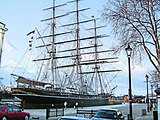Wikipedia:Wikipedia and shipwrights
This is an essay. It contains the advice or opinions of one or more Wikipedia contributors. This page is not an encyclopedia article, nor is it one of Wikipedia's policies or guidelines, as it has not been thoroughly vetted by the community. Some essays represent widespread norms; others only represent minority viewpoints. |

In a real sense, the editing of Wikipedia articles is the work of shipwrights—people seeking to make craft which will sail straight and true on the oceans and rivers of the world—and the judgment is not whether the workers smoke and drank, but the nature of the craft they produce.
If the craft are badly balanced and ballasted, they shall fail that task. If the craft lack proper wood joining, or metal riveting, they shall fail that task.
Some editors produce "stubs" which are the metal dinghies of the world. Such craft go short distances, and carry little, but they are essential in the total area of ships.
Others produce fine canoes—perfect examples of woodcraft, designed to take the sailors—the readers—through wondrous vistas on rivers around the world.
Still others produce the great freighters—designed to carry goods and materials vast distance around the globe. These are the writers of science more than of entertainment—more for the goal of carrying the goods than of amusing those sailing.
A few produce the great ocean liners—carrying vast numbers of passengers across the seas, seeing great and important places.
What is important, however, is that we never forget the one essential requirement—that the ship be able to sail straight and true in whatever waters. When we pay more attention to whether the builders of the Cutty Sark drank and smoked than we do to the ship, we have lost the pole star of shipbuilding. When we fire those who swear, in favour of those who meekly place rivets every six inches without fail, we lose the "craft" and gain naught in exchange.
Therefore, let us praise all the types of shipwrights found on Wikipedia—those who craft the small canoes, and those who build the mighty ocean liners, those who produce the smallest dinghies and those who seek to make sure the ships sail straight and true.
Raise a toast to those who build the ships, and ignore those who are more concerned about whether they swore as they built them.
In the end, what counts is the ships, and if those who do not swear produce ships which do not sail straight and true—such are not shipwrights at all.
